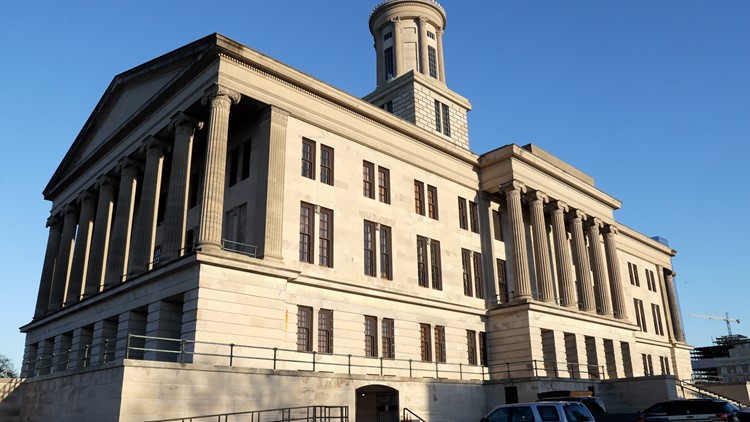NASHVILLE, Tenn. — Tennessee's Republican-dominant Statehouse approved a $52.8 billion spending plan Thursday for the upcoming fiscal year that includes an eye-popping $1.95 billion tax break and refund for businesses, but little new tax relief for most Tennessee families.
Even with the budget approved in the House and Senate, lawmakers still remained largely divided on whether they'll advance any proposal to spend vastly more public money to send students to private schools throughout the state. In a budget crafted during slowing state revenues, it sets aside $144 million for a universal school voucher bill that has not passed, in case the deadlock breaks in the final days of the annual session.
Republican Tennessee Gov. Bill Lee has made universal school vouchers his top legislative priority. However, even with a GOP supermajority, the massive change faced an uphill battle as many rural lawmakers have remained hesitant about funneling their limited public dollars away from local schools.
Legislative leaders conceded Wednesday that hopes of a last-minute voucher solution were dwindling. The upcoming weekend offers a final negotiation opportunity to resolve the glaring differences between the House and Senate.
Currently, the House version would overhaul standardized testing for public school students, changing teacher and principal evaluation requirements, covering more of the educators’ health insurance premiums, and phasing out so-called turnaround districts for low-performing schools.
The Senate version would require testing for students who receive the vouchers, unlike the versions by the House and governor. It also would broadly allow families to send their children to public schools outside their current district.
Democratic lawmakers criticized the budget proposal as being out of touch and failing to address the real problems facing most families. Some opponents of the budget's priorities were kicked out of the House gallery for shouting during the floor session.
“My problem with this is that everything in here is bad,” said Democratic Rep. Justin Pearson, describing the handful of modest grants to address mental health, rural health care and community resources as “cute.”
“But budgets are moral documents, they articulate the priorities of the people in power to the people we represent and this budget does not have any regard to ensure one out of eight kids are no longer hungry,” Pearson added.
Republicans countered that the budget includes $15 million for the child care improvement fund, $2 million for emergency medical services grants and additional money for behavioral health and public hospitals.
“I believe anyone who takes a deep dive into the budget will see that we are prioritizing children, families, safety, health and social services," said Republican Rep. Patsy Hazlewood, who oversees the House's finance panel. "That’s where the majority of our dollars are being spent.”
Aside from the voucher funding, a large amount of criticism has remained on about $400 million annual in tax breaks and $1.5 billion in refunds for businesses. The House and Senate remain split on the specifics, and under the House version, the $1.5 billion pot for refunds would be roughly cut in half, and the names and amounts of the companies taking a refund would be made public.
Last fall, Republican legislative leaders say a law firm representing a large group of businesses contacted the state to question the legality of Tennessee’s 90-year-old franchise tax and demanded a refund.
However, details about what specific businesses raised the original legal concerns have remained hidden. State leaders have refused to disclose what businesses have requested a refund.
The original number of the group of businesses who reached out to lawmakers last fall was originally disclosed at around 80, but at least one lawmaker stated that the law firm represented “hundreds” of individuals.
But the biggest question remaining is whether lawmakers will strike a last-minute deal to expand its school voucher offerings.
Lee first asked lawmakers to consider expanding school vouchers back in 2019, when the plan was to allow parents of students in certain low-income districts with three or more schools ranked in the bottom 10% to receive $7,300 from a government-authorized account to pay for approved expenses.
After much editing, Republicans just barely passed a program that only applied to Democratic strongholds in Davidson and Shelby counties, which encompass Nashville and Memphis. Lee’s victory came as some GOP members received assurances that it would never apply to their own districts.
The program, known as education savings accounts, has since added Hamilton County, where Chattanooga is located.



